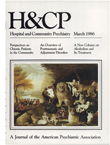A Survey of the California Alliance for the Mentally Ill
Abstract
Family groups are becoming increasingly active in providing support to family members and in mental health advocacy. The authors report the results of a survey that assessed the concerns of members of the California Alliance for the Mentally Ill and the treatment history of disabled family members. The 199 respondents were typically the parents of a schizophrenic son between the ages of 24 and 34 whose illness was first noticed in the late teens and for whom assistance had been sought for at least a decade. The respondents indicated that medication, family support, socialization centers, community residential treatment, and locked facilities had most helped the family member to improve. The most important additional needs were housing, vocational, and social opportunities and research.
Access content
To read the fulltext, please use one of the options below to sign in or purchase access.- Personal login
- Institutional Login
- Sign in via OpenAthens
- Register for access
-
Please login/register if you wish to pair your device and check access availability.
Not a subscriber?
PsychiatryOnline subscription options offer access to the DSM-5 library, books, journals, CME, and patient resources. This all-in-one virtual library provides psychiatrists and mental health professionals with key resources for diagnosis, treatment, research, and professional development.
Need more help? PsychiatryOnline Customer Service may be reached by emailing [email protected] or by calling 800-368-5777 (in the U.S.) or 703-907-7322 (outside the U.S.).



